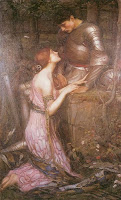
I've been pretty interested in the poet John Keats since I saw the movie Bright Star and was so mesmerized by his ability to paint vivid, breath-taking word pictures. If I could write like Keats, no matter how old-fashioned it might sound, I would.
Anyway, I've decided to brush up on my 19th century poets...well, Keats anyway, and found a book of his poems at Deseret Industries (fabulous place to get inexpensive books for no more than $3, btw). I've been skimming through this compilation of his works over the last few months, but today, I was captivated by two of his longer, myth poems. The first is called Isabella or The Pot of Basil: A Story of Boccaccio, which I assume means that the story was originally told by Giovanni Boccaccio, the famous 14th century author and humanist.
This story is really sad and kind of...no make that really morbid, but very beautifully and pathetically written. Keats has a way of writing so you don't really get the morbid thing.
The story is about a woman named Isabella and a man named Lorenzo who fall in love and are so happy, but Isabella's brothers are hoping to marry her off to a Nobleman. Consequently the loveafair can't last, and Isabella's brothers end up luring Lorenzo out into the forest where they kill and bury him. There's more to it and it ends totally tragic and morbid. But it's oh, so beautifully written. Keat's writing is like eating a fine, french chocolate tart without the whip cream--a perfect balance of everything.
The second poem I read was his Lamia poem. While Isabella was sad in an adolescently depressive way, Lamia was much more tragic, because aside from the Greek mythology, it was more heart-wrenchingly believable.
For those of you who don't know who Lamia is in Greek mythology, she's a water serpent kind of nymph who lures in lovers. Keats puts her in a much more sympathetic light in his poem, which I like. The story is about her making a bargain with Hermes to become human and be able to woo and wed a man named Lycius she's fallen in love with. 
It's funny to me how the tragic love story is so timeless. It's like we as human beings love to hurt. But there's something beautiful about that kind of ache a tragic love story brings. I'd say out of the two, Lamia was my favorite.
I'm a huge fan of mythology and especially artistic interpretations of them in art, poetry, lit and music. If you're the same way, Keats is worth picking up, even if it's just to read these two poems. Put in lame man's terms, the stories are heavy on the pathos, but when you put them to Keats language, he kind of transforms them into something really sophisticatedly magical and exquisite.
Anyway, just thought I'd deviate from the Young Adult book recommendations I've mostly given on this blog, and recommend something more substantial.
Happy Reading!
Tuesday, March 9, 2010
Keats
Posted by Hannah at 1:45 PM
Subscribe to:
Post Comments (Atom)

0 comments:
Post a Comment